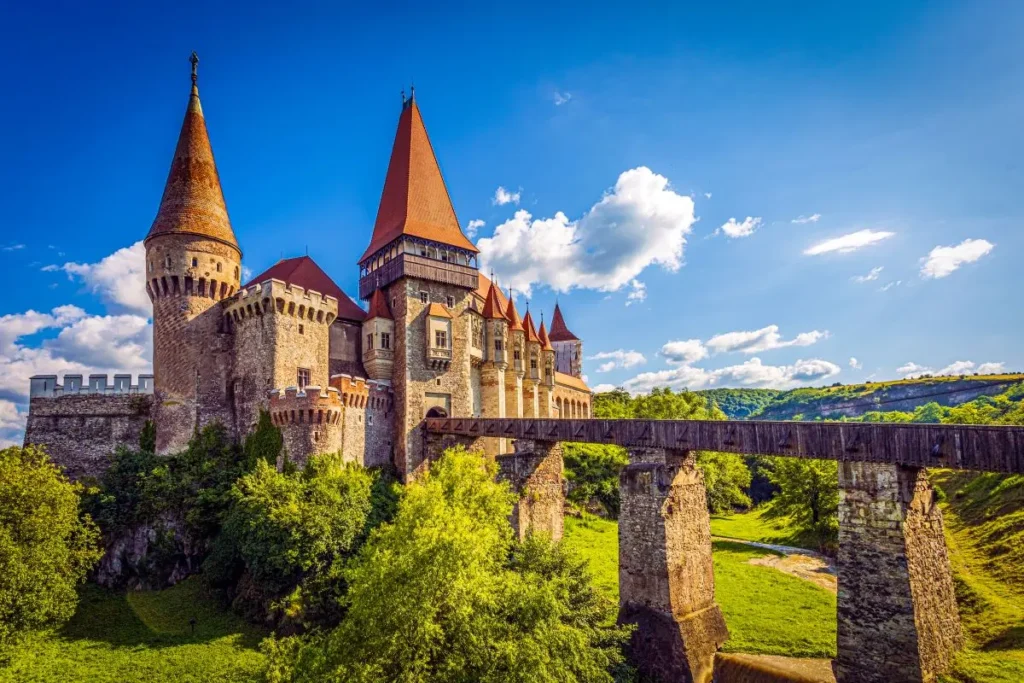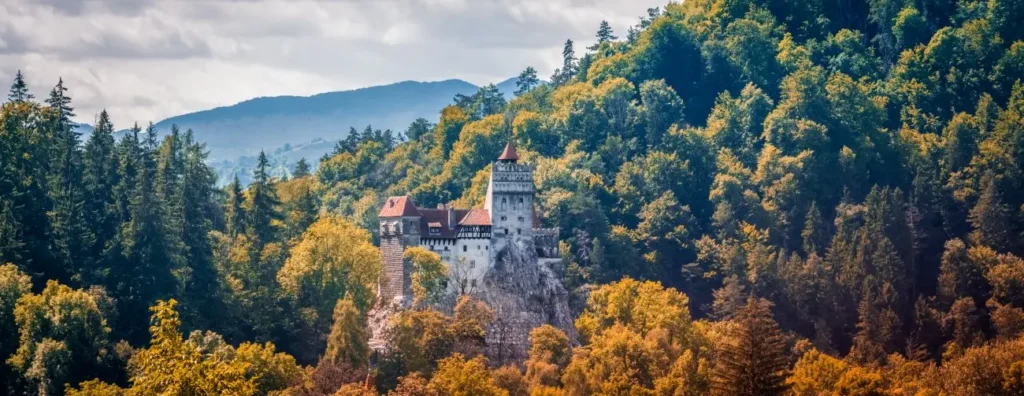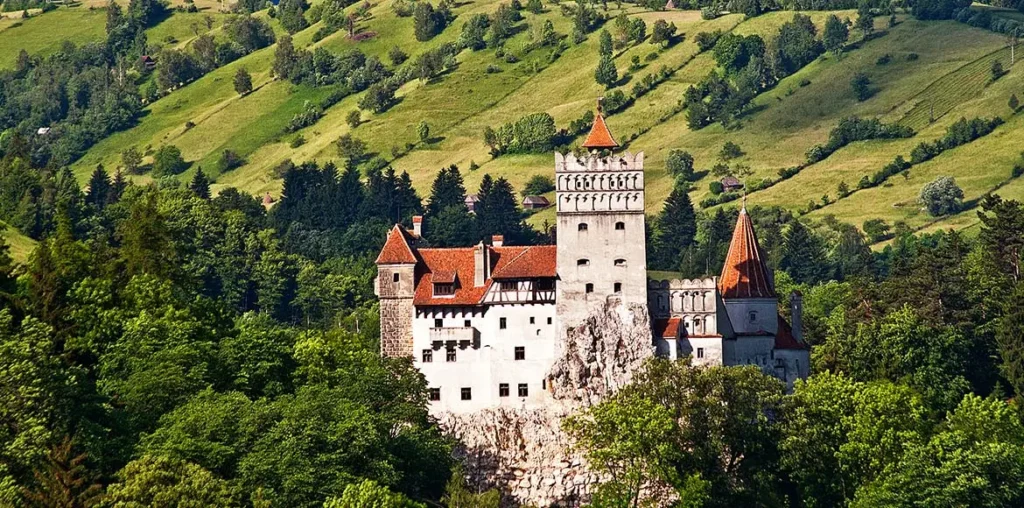Chapters
Corvin Castle Romania (Castelul Corvinilor) also known as Hunyadi Castle is located in the Hunedoara county, and many call it “one of the seven wonders of Romania”. It is one of the largest castles in Europe, and an important piece of history for Romania. Corvin Castle is also the largest medieval castle in Transylvania, surpassing even the mysterious Bran Castle and the royal Peles Castle.
Where to Find Corvin Castle Romania
You’ll find Corvin Castle at Curtea Corvineștilor 1–3, right in the heart of Hunedoara. Not sure where that is on the map? Here are some major cities nearby to help you get your bearings: Deva sits just 12 miles to the north, Alba Iulia is around 50 miles east, Sibiu lies about 80 miles farther east, and Timisoara is roughly 105 miles to the west. Whether you’re plotting a road trip or hopping a train, these cities make perfect starting points for your adventure to this legendary fortress.
Hunedoara: A Hub of Medieval Ironwork
During the 14th and 15th centuries, Hunedoara emerged as a powerhouse for iron extraction and weapon manufacturing in Transylvania. The region’s rich iron ore deposits fueled a thriving industry, making Hunedoara famous for producing swords, spears, and other armaments that found their way across Europe. This reputation not only underscored the area’s strategic significance but also contributed to the castle’s enduring legacy as a center of military innovation and strength.
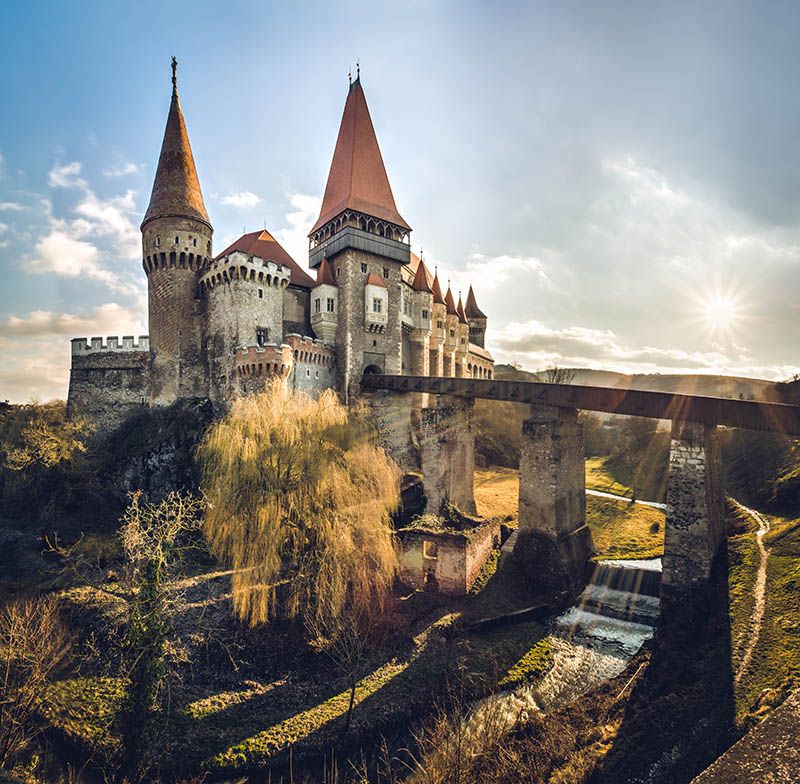
Many refer to it as one of the seven wonders of Romania, and it had a big impact on popular culture, inspiring people such as Bram Stoker in their work. Its name derives from the name of the one who ordered its construction, John Hunyadi, and his son, Matthias Corvinus, the King of Hungary between 1458 and 1490. The Corvin family had a great impact on Europe during the 15th century, with John Hunyadi (commonly known as Iancu de Hunedoara) becoming famous for stopping the Ottoman Empire from conquering Belgrade and advancing towards Western Europe. The Corvin family is related to the family of Vlad the Impaler, but their story is filled with conspiracies and betrayals.
Transformation from Fortress to Castle
Originally, the site of Corvin Castle served as a fortress until the mid-14th century. It wasn’t until John Hunyadi, also known as Iancu de Hunedoara (Ioannes Corvinus in Latin, Hunyadi in Hungarian), became the Voivode of Transylvania that the fortress was transformed into the impressive Gothic-Renaissance castle we see today. Iancu undertook significant upgrades, turning the old stronghold into a stunning residence befitting his status and ambitions.
A Dynasty Forged in Battle
Throughout history, John Hunyadi organized and supported several campaigns against the Ottoman Empire, which were also backed by Vlad II Dracul, the Prince of Wallachia (not to be confused with Vlad III, also known as Vlad the Impaler or Vlad Dracula). The first battles against the Ottomans started in 1438 after they successfully occupied a large part of Serbia. John Hunyadi was one of the few noblemen in the area who organized raids against the invaders and managed to defeat them in small skirmishes, which contributed to the rise of his fame. Thus, King Albert appointed Iancu de Hunedoara and his brother as Bans of Severin and named them “true barons of the realm.” In 1441, John Hunyadi together with Nicholaus Újlaki defeated the troops of King Vladislaus’ opponents, and as gratitude, the King appointed them Voivodes of Transylvania and Counts of the Székelys. Towards the end of his life, Iancu de Hunedoara supported Vlad Dracula (Vlad the Impaler) in seizing the Wallachian throne from Vladislav II and becoming Prince of Wallachia.
Constructionof Corvin Castle Romania and Legacy
The construction work for the Hunyadi Castle began in 1440, and it was designed as a defense fortress and a prison. The towers often held captive war prisoners as well as ordinary criminals. It is said that inside the castle, there was a bear pit where prisoners were thrown to be mauled to death by wild animals. The castle was built in a Renaissance-Gothic style, and it was laid out on top of an older fortification on a cliff above the Zlaști River. To the basic construction, numerous additions were made throughout the years, especially in the 17th century.
The Corvin Castle is split into 3 large areas: the Knight’s Hall, which was used for feasts, the Diet Hall, which was used for ceremonies, and the circular stairway. All of the halls have a rectangular shape, and their walls are beautifully decorated with marble. Today, the castle receives hundreds of tourists every day, many of them unaware of the fact that they are treading in the footsteps of some of the most important rulers of medieval Europe.
Damage and Restoration in the 19th Century
Corvin Castle Romania has weathered its share of twists and turns, but perhaps none as dramatic as the fire of 1854. On an unlucky April night, a bolt of lightning sparked a blaze that tore through the castle, consuming nearly all of its wooden structures—roofs, beams, staircases, and doors—leaving only the formidable, centuries-old dungeon door standing strong amid the ashes.
After this devastating incident, the castle was left abandoned for a decade, its empty halls echoing with memories rather than revelry. Yet, Corvin Castle’s story was far from over. Determined to return the fortress to its former glory, a comprehensive restoration began, spanning more than 40 years. Craftsmen and visionaries worked tirelessly to rebuild what had been lost, blending respect for the original architectural style with the practicalities of the age.
Through these efforts, Corvin Castle was revived, standing once again as a breathtaking testament to resilience and historical continuity.
The legend of the Corvin Castle’s well
One of the most fascinating features of Corvin Castle is its impressive stone well, sunk deep into the courtyard. According to local legend, this well wasn’t just your average medieval water source—it was supposedly dug by three Turkish prisoners. They were promised their freedom if they could find water, a promise that became a test of both endurance and hope.
Day by day, the prisoners toiled, chipping away at solid rock. After an extraordinary 15 years (and, as tradition insists, 28 long days beyond that), they finally struck water nearly 30 meters below the surface. There are whispers that an inscription by the well’s edge is a testament to their ordeal and dashed hopes—a reminder that, even in a place built for defense and intrigue, stories of human perseverance persist.
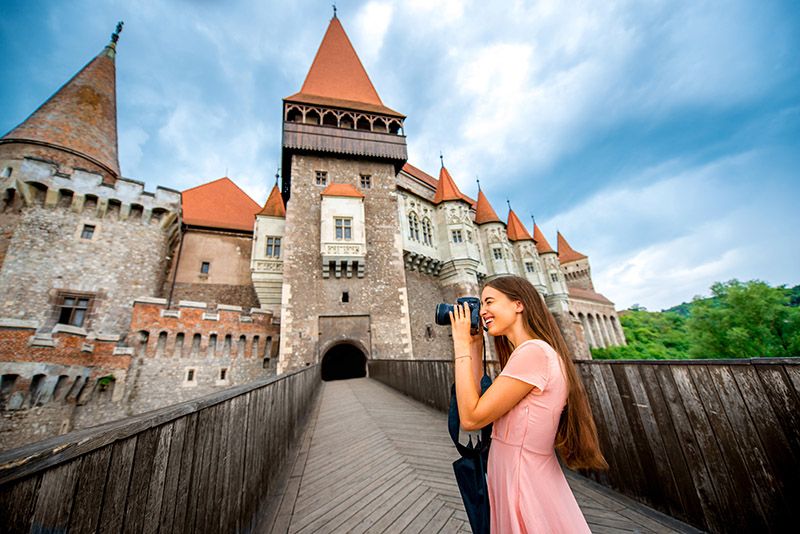
The “Nje Boisia” Tower: Defending the Fortress
One of the castle’s most distinctive defensive features is the so-called “Nje Boisia” tower—its name roughly translates to “Don’t Be Afraid.” Built specifically for military purposes, this five-level tower was constructed with numerous firing openings, allowing defenders to repel would-be attackers from multiple vantage points.
Access to the “Nje Boisia” tower is an experience in itself. A 100-foot-long elevated corridor, dramatically supported by massive pillars, links the tower to the main body of the castle. This suspended walkway not only ensured swift movement for soldiers but also added another layer of protection, making it far more difficult for enemies to breach the stronghold.
The legend of the Hunyadi Castle
The coat of arms of the Corvin family is a raven with a golden ring in its beak, and this family symbol has a legend. It is said that John Hunyadi was the illegitimate son of King Sigismund of Luxemburg and Hungary, and his mother was Elisabeta, a very beautiful woman from the Hateg region. In order not to dishonour her, the king married Elisabeta to one of his knights, Voicu. Sigismund also gave her a ring, as a gift for the unborn child, which will help him be recognized when he will go to the royal court.
The legend says that during a trip, the family halted for lunch, but when they were not paying attention, a raven stole the ring, attracted by its shine. That’s when John Hunyadi took a bow and shot the raven in order to get the ring back. When he heard the tale, the King was deeply impressed, so he decided that the family’s symbol would be a raven with a golden ring in its beak. Moreover, the name of the Corvin family comes from the Latin word “Corvus”, which means “Raven”.
In popular culture, the name of Corvin was used in the Underworld film series, inspired by the Legend of Dracula, and the Corvin Castle appeared in numerous video games and TV shows, such as Age of Empires II HD The Forgotten, Most Haunted Live!, and Dragonheart: Battle of the Heartfire. It is also believed that the Hunyadi Castle, alongside Poenari Castle and other medieval castles in Romania, was a great source of inspiration for Bram Stoker’s famous novel, Dracula.
Visiting hours:
Open every day
Monday: 12:00 PM – 08:00 PM
Tuesday – Sunday: 09:00 AM – 08:00 PM
*The last entry is 45 minutes before closing time.
Ticket Prices:
Adults – 50 Ron
Students – 12 Ron (based on the card stamped for the current year)
College Students – 12 Ron (based on the transport card stamped for the current year)
Pensioners – 25 Ron (based on coupon pension)
Private Events and Celebrations at Corvin Castle
While Corvin Castle stands today as a renowned museum, its atmospheric halls and picturesque courtyards are sometimes transformed for private events and unique celebrations. On select occasions, the castle opens its grand spaces for gatherings such as weddings, galas, or cultural festivities, offering guests the unforgettable experience of celebrating within medieval walls rich with history.
Hosting an event at Corvin Castle allows you to step beyond the role of visitor and become part of the living story of this legendary fortress—making memories in rooms that once echoed with the footsteps of knights, nobles, and kings.

